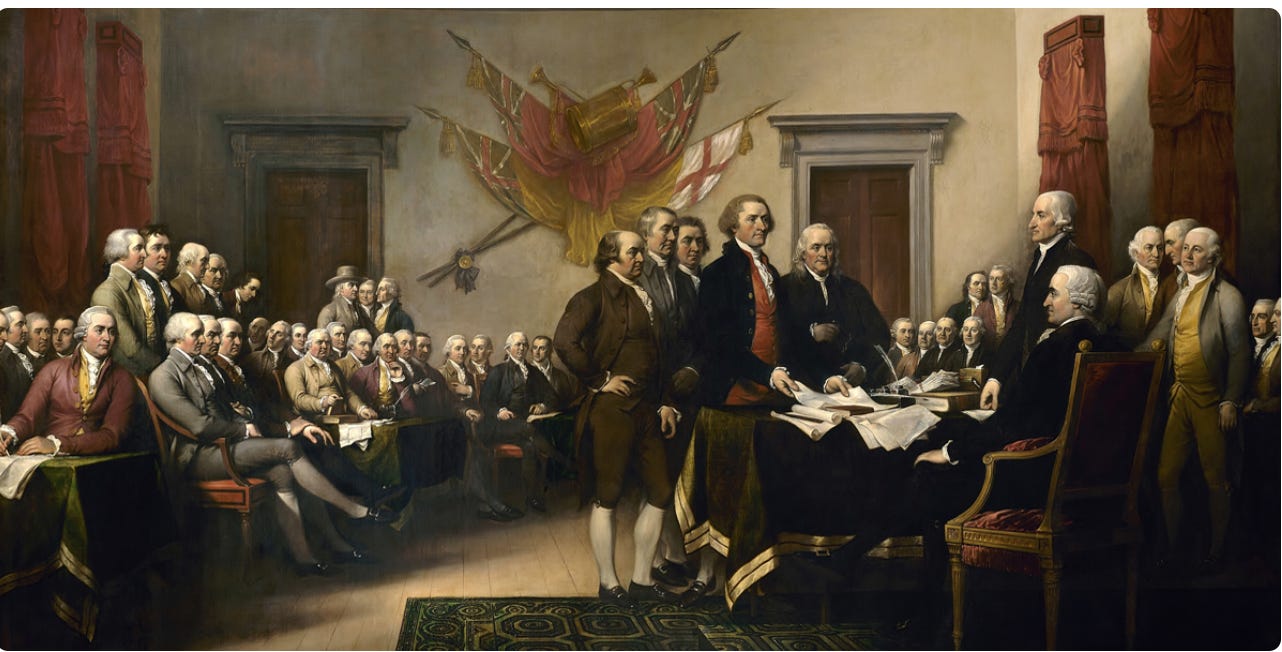“The Pensive and Awful Silence”

Originally published on Courageous Discourse
Dr. Benjamin Rush on signing the Declaration of Independence

What most of us remember about the Declaration of Independence is Thomas Jefferson’s preamble, which contains many soaring assertions about which lawyers and political philosophers could spend a great deal of time debating. Needless to say, King George and his ministers did NOT find Jefferson’s reasoning persuasive. Eighty-four years later, President Lincoln did NOT find persuasive the reasoning set forth in the Confederate States of America – Declaration of the Immediate Causes Which Induce and Justify the Secession of South Carolina from the Federal Union. As a rule, heads of state are reluctant to accept such declarations of independence issued by regional governors and legislators.
We now look back on the Declaration of Independence with the benefit of knowing that the bold enterprise actually worked out—that is, that the American colonists prevailed in the war against Britain and achieved their independence from the British Crown. However, at the time the 56 signers actually signed the document (on August 2, 1776), it was FAR from clear that their endeavor would work. In signing their names to the document, they knew they were committing High Treason and were therefore subjecting themselves to being put to death and their property confiscated. The latter penalty was almost as terrible, because most of them (in their thirties and forties) had wives and children who were dependent on them.
In 1811, reflecting back on the occasion in a letter to John Adams, the Pennsylvania representative, Dr. Benjamin Rush wrote:
“The pensive and awful silence which pervaded the house when we were called up, one after another, to the table of the President of Congress to subscribe what was believed by many at that time to be our own death warrants. The silence and gloom of the morning was interrupted, I well recollect, only for a moment by Benjamin Harrison of Virginia, who said to Elbridge Gerry at the table, I shall have a great advantage over you, Mr. Gerry, when we are all hung for what we are now doing. From the size and weight of my body I shall die in a few minutes, but from the lightness of your body you will dance in the air an hour or two before you are dead. This speech procured a transient smile, but it was soon succeeded by the solemnity with which the whole business was conducted.”
It’s a wonderful piece of gallows humor that captures the bold adventure upon which these guys were embarking. As things turned out, none of them were actually put to death for treason, though some were imprisoned and lost their property. A particularly poignant case was Francis Lewis (1713-1802) of New York. His wife died as an indirect result of being imprisoned by the British, and he lost all of his property on Long Island during the war. When his wife died, Lewis left Congress and completely abandoned politics.
Nowadays, safely ensconced on America’s college campuses, it has become fashionable for professors and students to criticize the signers—and especially the author, Thomas Jefferson—as privileged white men, many of whom owned African slaves. For today, I’ll leave this discussion aside and simply mention the COURAGE mustered by the fifty-six signers. All of them had a lot to lose.
One of our country’s most important freedoms is that of free speech.
Agree with this essay? Disagree? Join the debate by writing to DailyClout HERE.



